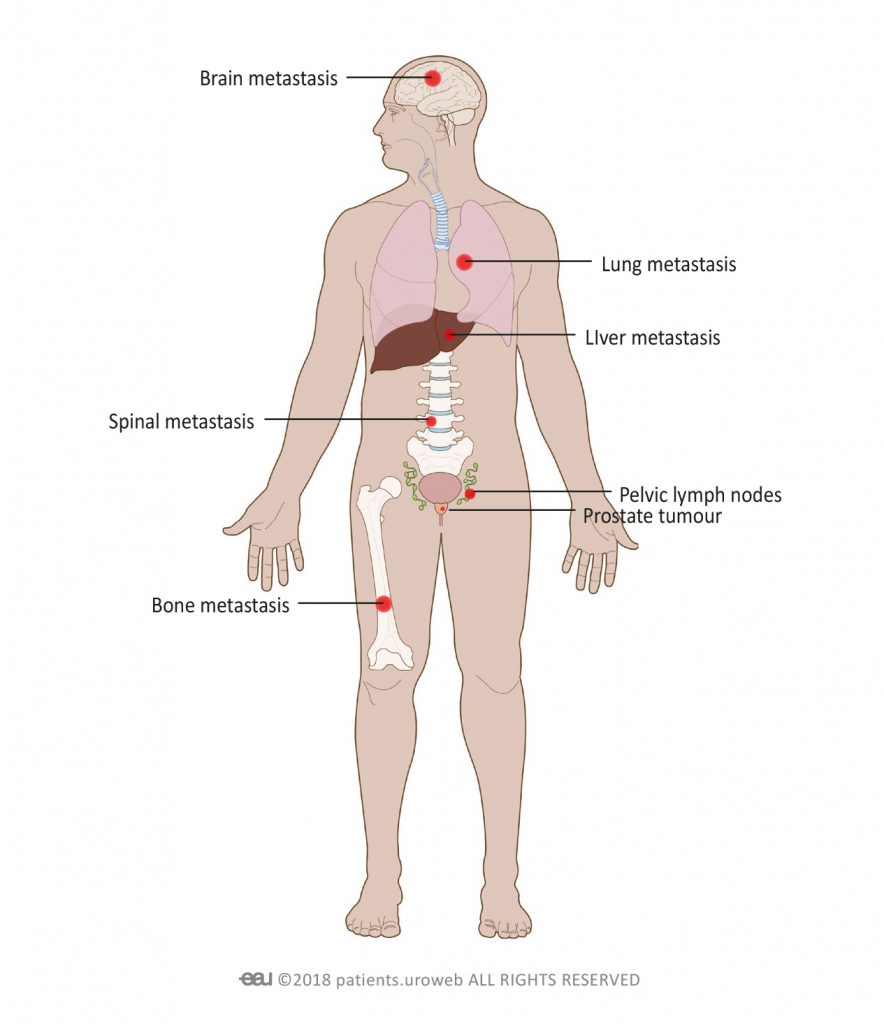Table of Contents
What is metastatic disease?
Prostate cancer can spread to other organs or lymph nodes outside the pelvic area. This is called metastatic disease. The tumours in other organs or lymph nodes are called metastases. Your doctor may recommend treating metastatic disease with hormonal therapy.
It is important to realise that metastatic disease cannot be cured. Instead, your doctor will try to slow the growth of the tumour and the metastases. This will give you the chance to live longer and have fewer symptoms.
If prostate cancer metastasises, it usually spreads to the bones or the spine. At a later stage, prostate cancer may also spread to the lungs, the liver, distant lymph nodes, and the brain (Fig. 1). Most metastases cause a rise in the level of prostate-specific antigen (PSA) in your blood.
Metastases in the spine can cause symptoms like severe back pain, spontaneous fractures, or nerve or spinal cord compression. They can also be asymptomatic. In rare cases, lung metastases may cause a persistent cough.
Imaging can be used to detect metastases. Bone metastases can be seen on a bone scan. A CT scan may be recommended to get more detailed information about bone metastases, or to detect metastases in the liver, the lungs, or the brain.
This section addresses different types of hormonal therapy, which you should discuss with your doctor.
This is general information, which is not specified to your individual needs. Keep in mind that individual recommendations may depend on your country and health care system.
Treatment options for metastatic prostate cancer
If you have metastatic prostate cancer, your doctor will recommend hormonal therapy. This is part of a palliative care approach. The treatment will slow the growth of the primary tumour and the metastases, and help to manage the symptoms. Your doctor may also recommend that you have a type of chemotherapy (called Docetaxel chemotherapy) when you start hormone therapy as this has been shown to help men live longer
Another name for hormonal therapy is androgen deprivation therapy (ADT). It can be performed surgically or with drug treatment.
In surgical therapy, both testicles are removed in a procedure called bilateral orchiectomy.
Drug therapy to stop the production of androgens is done with LHRH agonists or LHRH antagonists. These drugs are available as depot injections right under the skin or into the muscle. Anti-androgens are drugs that block the action of androgens. They come as a pill. All of these therapies cause castration.
Castration has physical and emotional consequences. The most common are hot flushes, lower sex drive, and erectile dysfunction. The effects of surgical castration are permanent. In chemical castration, some of the symptoms may disappear after the treatment. Do not hesitate to discuss any concerns with your doctor.
If you have bone metastases which cause symptoms while you receive drug treatment, radiation therapy may help to relieve them and prevent fractures.
LHRH agonists are the most commonly recommended treatment for metastatic prostate cancer, but the choice of treatment is always based on your individual situation. These are some things your doctor will consider when planning your care pathway with you:
- Your age
- Your medical history
- Where the cancer has spread to
- Your symptoms
- The kind of treatment available at your hospital
- Your personal preferences and values
- The support network available to you


